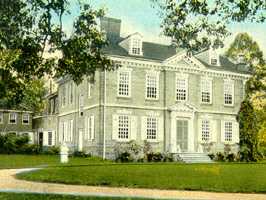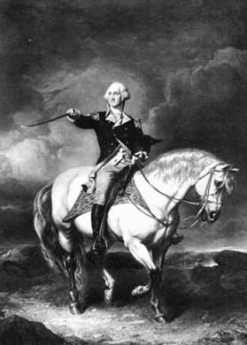Related Topics
To Germantown, a Short Appreciation
Seven miles from the heart of Philadelphia, Germantown was once a separate town, the cultural center of Germans in America. Revolutionary battles were fought here, it was briefly the capital of the United States, and it still has an outstanding collection of schools and colleges.
The British Attack Philadelphia
Fighting in the Revolutionary War lasted eight years; for two years (June 1776 to June 1778) Philadelphia was the main military objective of the British.
Touring Philadelphia's Western Regions
Philadelpia County had two hundred farms in 1950, but is now thickly settled in all directions. Western regions along the Schuylkill are still spread out somewhat; with many historic estates.
The Main Line
Like all cities, Philadelphia is filling in and choking up with subdivisions and development, in all directions from the center. The last place to fill up is the Welsh Barony, a tip of which can be said to extend all the way in town to the Art Museum.
Philadelphia People
New topic 2017-02-06 20:33:59 description
The Battle of Germantown: Oct. 3, 1777
After its brief commotion from the unwelcome French and Indian War, Germantown settled down to a 22-year period of colonial inter-war prosperity and quite vigorous growth. Most of the surviving hundred historical houses of the area date from this period, and it might even be contended that the starting of the Union School had been a beneficial stimulus.

|
| Cliveden |
Two decades passed. What we now call the American Revolution started rumbling in far-off Lexington and Concord, soon moved to New York and New Jersey. General William Howe, the illegitimate uncle of King George III, then decided to occupy the largest city in the colonies, tried to get his brother's Navy up Delaware but hesitated to persist in a naval attack on the chain barrier blocking the river. He considered but abandoned trying to outflank the New Jersey fort at Red Bank, the land-based artillery at Fort Muffling, and heaven knows what else along the twisting shaggy Delaware river. Giving up on that approach, Howe sent the navy down to Norfolk and back up the Chesapeake, landing the troops at the head of the Elk River. Washington was outflanked at the Battle of the Brandywine Creek trying to head him off, although he suffered far fewer casualties than the British. A rainstorm, presumably a fall hurricane, disrupted his planned counterattack near Paoli. So Howe invested Philadelphia, organizing his main defensive position in the center of Germantown. His headquarters were in Stenton and Morris House, General James Agnew was at Grumblethorpe The Center of British defense was at set up at Market Square where Germantown Avenue crosses Schoolhouse Lane. With Washington retreating to Valley Forge, that should take care of that. Raggedy rebels were unlikely to attack a prepared hilltop position with a river on either side, defended by a large number of British regulars.

|
| George Washington |
Washington did not look at things that way, at all. Cut off from their fleet, the British situation would be precarious until Delaware could be re-opened. He had watched General Braddock conduct with bravado an arrogant suicide mission in the woods near Ft. Duquesne, and also knew the British always based as much strategy as possible on their navy. Washington's plan was to attack frontally down the Skippack Pike with the troops under his direct command, while Armstrong would come down Ridge Avenue and up from the side. General Greene would attack along Limekiln Road, while General Smallwood and Foreman would come down Old York Road. In the foggy morning of October 3, the main body of American troops reached Benjamin Chew's massive stone house, now occupied by determined British troops, and General Knox decided this was too strong a pocket to leave behind in his rear. Precious time was lost with an artillery bombardment, and unfortunately, the flanking troops down the lateral roads were late or did not arrive at all. The forward movement stopped, then the British counter-attacked. Washington was therefore forced to retreat, but he did so in good order. The battle was over, the British had won again.
But maybe not. Washington hadn't routed the British Army or forced them to leave Philadelphia. They did leave the following year, however, and there was meanwhile no great desertion from the Colonial cause. Washington's troops suffered terrible privation and discouragement at Valley Forge, but the crowned heads of Europe didn't know that. For reasons of their own, the French and German monarchs were pondering whether the American rebellion was worth supporting, or whether it would soon collapse in a round of public hangings. From their perspective, the Americans didn't have to win, in fact, it might be useful if they didn't. But if they were spirited and determined, led by a man who was courageous and resolute, their damage to the British interests might be worth what it would cost to support them. The Battle of Germantown can thus be reasonably argued to have been an advancement of colonial goals, even if it could not be called a victory. However, when the news of Burgoyne's defeat at Saratoga soon reached them, the European enemies of England decided the colonists would be useful allies.
In Germantown itself, the process of turning a military defeat into a strategic victory soon began, with severe alienation of the German inhabitants against the destructive experiences of British military occupation. After a winter of near starvation, Germantown would never again see itself as the capital city of a large German hinterland. It was on its way to becoming part of the city of Philadelphia.
Originally published: Thursday, October 17, 1996; most-recently modified: Wednesday, May 22, 2019
| Posted by: dion harris | Mar 3, 2009 5:21 PM |
www.philadelphia-reflections.com/blog/1063.htm
| Posted by: George Fisher | Feb 2, 2009 11:22 AM |
| Posted by: josh671 | Feb 2, 2009 3:48 AM |